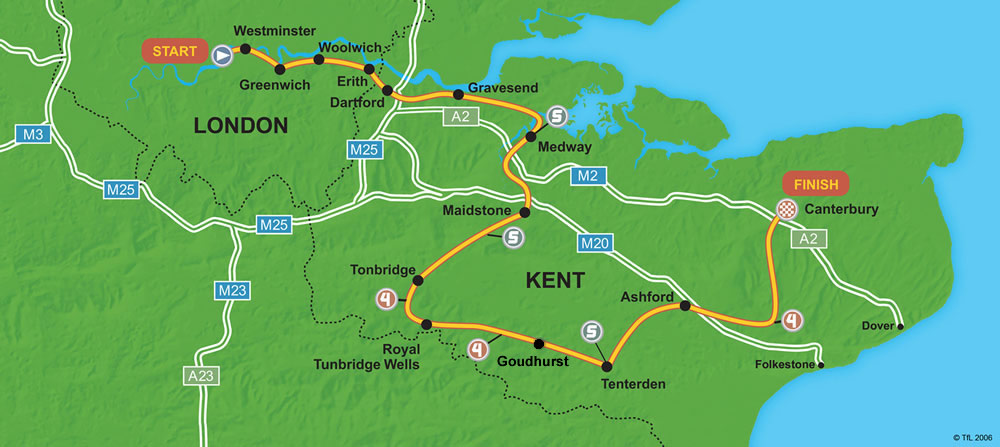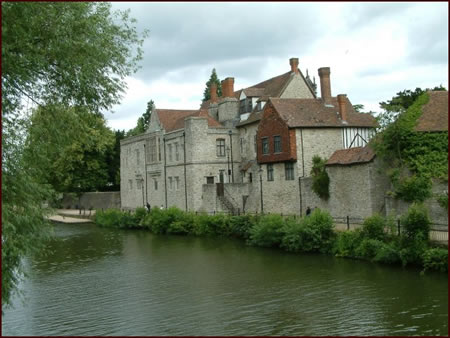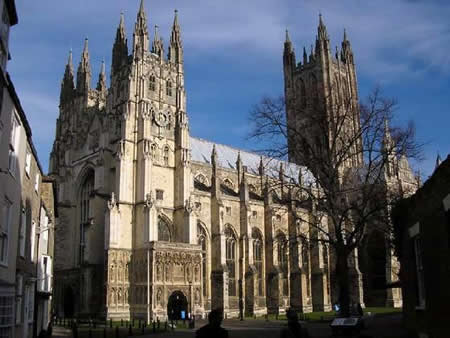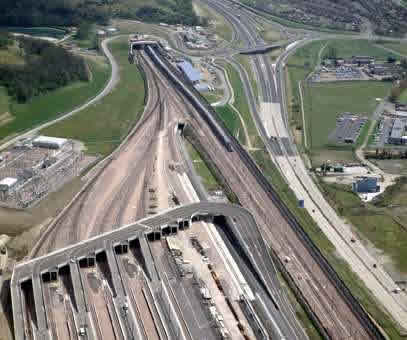Phenomenal – Le Grand Depart 07
On a recent trip back to my home town of Maidstone in England I was surprised to feel the influence of the Tour de France. After all it was December 2006 and I was without access to the web. My usual daily contact with the sport of cycling was in suspension. However I should not have been surprised as Maidstone lies on the route of the 2007 Tour.

Stage 1 - London to Canterbury
After my visit to England I was soon back on the computer to catch up with a week or so of cycling news across the web at my home office near Boston . Most of the recent cycling news made for depressing reading. Nothing but doom and gloom: Operacion Puerto, Landis, Basso, Ullrich, the UCI with it's transparent power plays and endless fights with WADA, the Grand Tour organizers and just about everyone else.
My trip to England had helped me to step back and take a fresh look at our sport. It was the Tour that refreshed my spirits. This past year the cycling media has largely portrayed a sport in great disgrace and in fear of serious decline. Yet all around there are those that move forward with grand plans and innovative ideas. The organizers of the Grand Tours, the Classics and the plethora of other races that make our sport so rich are busily preparing for next season. Shrewd businessmen, politicians, creative marketers, inventive course designers and many others combine to ensure that their races will attract sponsors, spectators and provide a healthy return on their investments all while delivering spectacular athletic events.

If the riders look left as they pass over Maidstone Bridge they will see the beautifully
preserved 14th Century " Archbishops Palace " on the banks of the River Medway.
After the Tour's Royal send off in the heady atmosphere of central London, the race on Stage 1 will spend a large portion of the day in the rural and gentle countryside of Kent which is often called the ‘Garden of England'. Maidstone comes at about half way along stage 1 of the 2007 Tour. The second ‘hot spot' sprint of the Tour will be contested just after the riders leave town. The actual race will enter and then leave this town of about 130,000 inhabitants within a brief 15 minutes at most.
The casual observer could be forgiven for thinking that Maidstone (or any other town along a stage route) receives very little attention from the race organizers. Nothing could be further from the truth. The great races are not great by accident! The secret to success lies in the details and in this respect the Tour organizers are certainly not lacking.
Most readers will have read about the tremendous promotional activities announcing “Le Grand Depart” in London. The Mayor of London, as well as many other important dignitaries, has eagerly associated himself with the Tour. The Prologue will have as its backdrop many of the most famous city landmarks in the world. In fact the stage finishes on ‘The Mall' with Buckingham Palace behind the riders and Admiralty Arch and Trafalgar Square ahead of them.
Although London has (apparently) received most of the attention, the reality is that Stage 1 is also receiving considerable preparation. While our attention was riveted on the unfolding Tour last July, the Tour organizers were busy reaching out to local English cycling clubs for help. A promotional event was created in Canterbury (which will host the stage finish for Stage 1) at the annual Canterbury Agricultural Show (July 14 – 16, 2006) and ‘Transport for London ' was tasked with putting on a Tour de France awareness demonstration. Friends from my old cycling club in Maidstone were recruited to help erect a stage and assemble turbo-trainers linked with a computer driven simulation system. Visitors could ride a virtual Prologue and/or mountain stage. The display and interactive activity was extremely popular and the visitor that rode the fastest Prologue won a mountain bike. Naturally VIP 's were encouraged to appear and it was fitting that the British National RR Champion (Christian House) should make an appearance and try his hand at the virtual stages.
Once the Canterbury event was over the Tour organizers cleverly extended their goodwill to the cycling club helpers by giving them each a handsome yellow TdF T-shirt, a ‘Grand Depart' CD and VIP passes for the Tour of Britain in September.
Back to Maidstone in December 2006. The local paper arrives on my mother's doorstep. Page 2 headline: “Tour de France to be phenomenal”. Wow! Here is some of the text:
The Tour de France will be coming through Maidstone on Sunday July 8 2007 and will dominate much of the town. ‘ Town Center Management' is already learning about preliminary preparations following a meeting with town police………. Attendance is expected to be phenomenal causing total disruption to the town center as all roads affected by the route will be closed from approximately 9AM to 2PM . Police advise that delivery times be managed to avoid hold-ups or delays and employees make arrangements so they are able to get to work………. There will be a huge entourage of some 240 pre-caravan vehicles supporting 200 racers and a further 400 support vehicles so expect a real carnival atmosphere with hats, sweets and memorabilia thrown to spectators……. The sprint section [hot spot, ed.] will be on the A26 around the Teston area……. After the race a massive clear-up operation gets underway.
Here we had a local newspaper, not a cycling journal, building excitement and anticipation for the race. Already expectations are clearly being set that normal life will be put on hold for the best part of a day. Perhaps in England the effort is a little more intense, but the Canterbury event and Maidstone 's local paper are fascinating examples of just how the Tour prepares for three weeks of world class sport each year. Since last July, and maybe before that, towns and villages, police and local utilities have been steadily ramping up for the big day when the Tour will pass over their roads.

Tenterden: the Tour will pass through many such Kentish villages.
Unlike mainland Europe, England is not accustomed to having its roads closed for cycle races. The efforts being made for the first two days of the 2007 Tour are truly monumental. After leaving the center of London on Stage 1 the race heads east along the Thames valley before turning south across the River Medway. At this point the route crosses possibly the busiest traffic corridor in Europe. The M2 and M20 motorways from Dover and Folkestone are the primary roads leading traffic to and from London and the rest of Great Britain to mainland Europe . Maidstone itself is a high density business center as well as a major ‘dormitory town' for those working in London. Shutting down the road system in this region is far from a trivial matter (in the UK it normally takes an ‘Act of Parliament' to sanction complete road closures).
As the UK newspapers have pointed out, the Tour de France is the biggest annual sporting event in the world. But its stature is only one aspect enabling the race to literally shut down parts of London and South East England for two days. Economically it is estimated that the UK will benefit from a ‘Tour tourism boost' worth around $230 million. Approximately two million visitors from around the world are expected to visit London and Kent for the three days (July 6 th opening ceremonies in London ; July 7 th prologue ITT ; July 8 th Stage 1). In addition to these numbers London and Kent will be ‘showcased' to the world through TV and other media.

Stage 1 will finish in Canterbury near to one of the most famous cathedrals in the world.
The Mayor of London has set the goal for the 2007 Tour Grand Depart to be “the greatest that the Tour has ever seen”. Naturally having the Tour focus the spotlight on the UK , and specifically on London and Kent , represents a great promotional vehicle for tourism. However the Tour's visit also incorporates many other beneficial spin-offs. At the top of the list is the 2012 Olympics. The Tour will demonstrate London 's ability to host a world class sporting event and provide the citizens of London and Kent a taste of what they can expect when they host the Olympics.
On past visits to Great Britain the Tour has experienced some of its biggest road side crowds ever. The beauty of the 2007 stages in England , together with the extensive preparations now being executed, all but guarantee record numbers again. While the majority of casual road side observers may not understand how the race classifications work, the fame and allure of the Tour is the same as that of the Olympics or any other major world class sporting occasion. The Yellow Jersey is possibly the most famous of all sports icons.
As I realized after my recent trip to England, we should all take a step back now and again to look at our sport with fresh eyes. You will see that cycling is truly phenomenal.

The British entrance to the Channel Tunnel, seen here, is at Cheriton, near Folkestone in Kent .
One of the greatest civil engineering projects of the 20th century, the tunnel (50.4 km/31 mi long) emerges at Coquelle, near Calais, France,
and is capable of carrying up to 600 trains each way daily. The Tour entourage will take the 'Eurostar' train and be 'home' in France just 35 minutes later.
Make www.cyclingrevealed.com your homepage now. |
